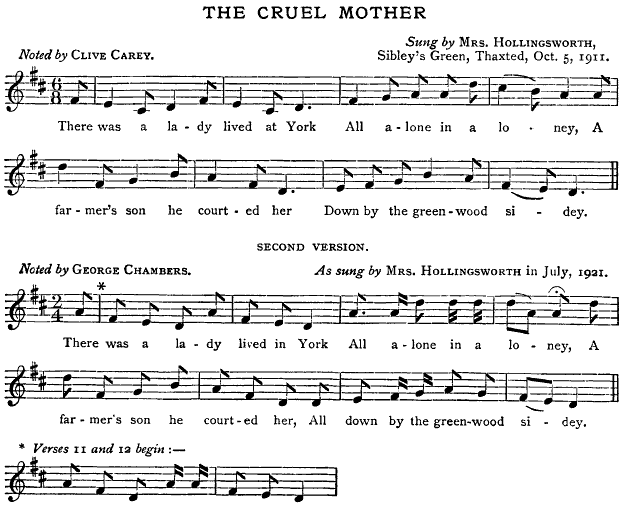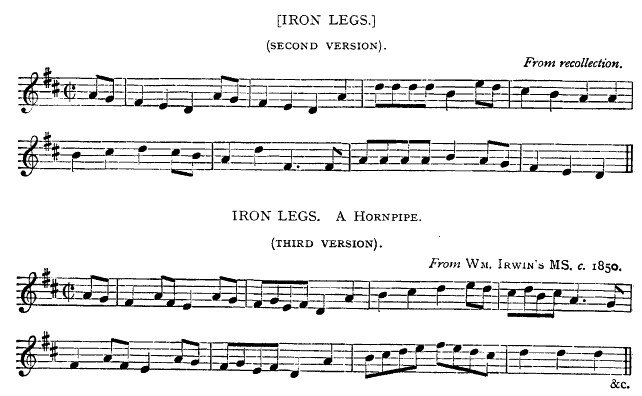The Cruel Mother- Hollingsworth (Thaxted) 1911; second version 1921
From: Five English Folk Songs
Journal of the English Folk Dance and Song Society, Vol. 1, No. 3 (Dec., 1934), pp. 130-137

[Full text]
1. There was a lady lived in York
All alone in a loney,
A farmer's son he courted her,
All down by the greenwood sidey.
2. He courted her for seven long years
All alone in a loney;
At last she proved in child by him,
All down by the greenwood sidey.
3. He [she] pitched her knee against a tree,
All alone, etc.
And there she found great misery
All down, etc.
4. She pitched her back against a thorn,
All alone, etc.
And there there was a baby born
All down, etc.
5. She drew a fillet off her head,
All alone, etc.
She bound the baby's hands and legs,
All down, etc.
6. She drew a knife both long and sharp,
All alone, etc.
She pierced the baby's innocent heart
All down, etc.
7. She wiped the knife upon the grass,
All alone, etc.
The more she wiped the blood run fast,
All down, etc.
8. She washed her hands all in the spring,
All alone, etc.
Thinking to [re]turn a maid again,
All down, etc.
9. As she was going to her father's Hall,
All alone, etc.
She saw three babes a-playing at ball,
All down, etc.
10. One dressed in silk the other in satin,
All alone, etc.
The other star[k] naked as ever was born,
All down, etc,
11. Oh, dear baby, if you was mine
All alone, etc.
I'd dress you in silk and satin so fine,
All down, etc.
12. Oh! dear Mother, I once was thine,
All alone, etc.
You never would dress me cos or fine,
All down, etc.
13. There heaven gates stand open wide,
All alone, etc.
There's room for me but none for you,
All down, etc.
14. There is a fire behind hell's gate,
All alone, etc.
And there you're burn both early and late,
All down, etc.
The first version was noted from the singing of Mrs. Hollingsworth by Mr. Carey and Mr. Chambers on October 5th, I9II. In I92I Mr. Chambers showed these words to Cecil Sharp, who was impressed with them because they gave a connected story with an immediate climax in the second verse and asked for the tune which was not at the time immediately available from Mr. Carey. Mr. Chambers therefore got Mrs. Hollingsworth to sing the ballad to him again in July I92I, when she was ten years older and by now an old woman. The result was the second version, which contains divergences from the first of some interest and importance.- F. H.
This interesting version is more like the broadside copy (c. 1690) "The Duke's Daughter's Cruelty" than any others I have seen, though the broadside tacks on three superfluous hack verses. There are some curious variations in the present copy, e.g. " pitched " for " leant," and an obvious corruption in verse 8, which should read "Thinking to return [as] a maid again" (perhaps "agin," as a folk-rhyme to spring.") V. I2, "cos [coarse] or fine" occurs in other versions, but the "fillet" of v. 4 is unusual, though found in the broadside- "She took her filliting off her head." The washing of the penknife in vain-" The more she washed, she bloodier it grew" - also occurs in the game-version of this ballad which I noted at a Southport Orphanage in I9I5 (see F.S. Journal, vol. vi, pp. 80-82). The "silk and satin so fine" of v. II is found as "silk and sabelline" (sable skin) in Kinlock's version (1827) - "Sabelline" being an old French word apparently longer understood in Scotland than in England. From various old dialect and other uses of the word "pitch" it seems to have meant to throw the weight of the shoulder or hip against something. "Pitch" also meant the point of a horse's or a man's shoulder. So that "pitch" in this version is a stronger word than "leant."
The tune is different from any other "Cruel Mother" tune I remember and has considerable resemblance to a north-country dance-air called "Iron Legs," which is one of Three Dale Dances arranged by Arthur Wood, and appears in a more elaborate
form as a hornpipe in the MS. tune-book of W. Irwin, an old Lake Country fiddler. "Iron Legs" again is a version of "The Bailiff's Daughter of Islington," which Chappell, who first printed it, stated to be the traditional tune "commonly sung throughout the country" to this ballad. As a ballad-tune I have also noted a Mixolydian version sung to " Mother, mother, make my bed," on the Sussex-Kentish border. His earlier copy in his National Airs has a rather livelier movement than as now sung. I append the two forms of " Iron Legs." I do not know the meaning of the name unless it be an epithet for a sturdy and untiring dancer!
A. G. G.
